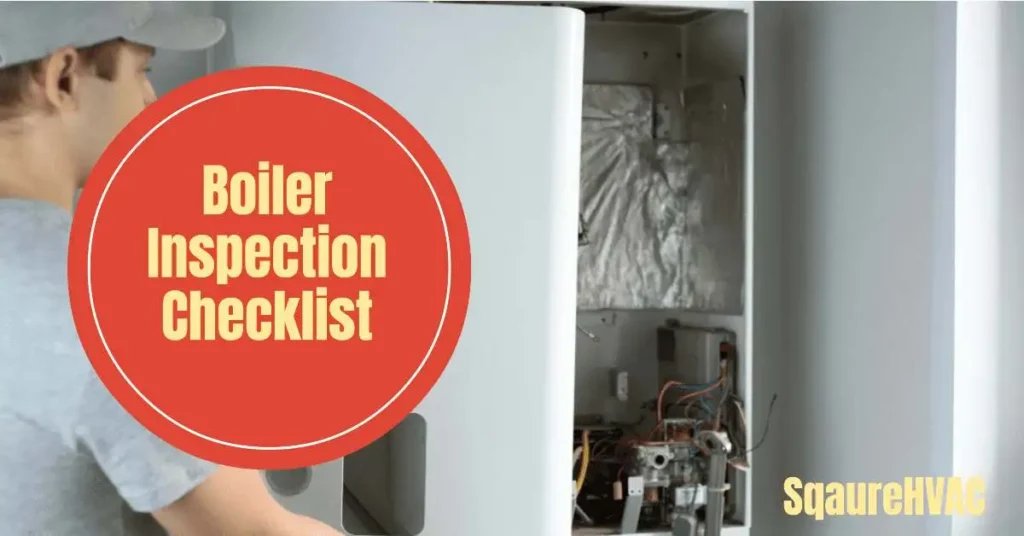A boiler inspection checklist is a crucial tool to ensure the safety and efficiency of boiler systems. Daily, monthly, and annual checks are necessary.
This includes inspecting equipment, components, and water for leaks or obstructions, vibrations, and unusual noises.
Types of Boilers
Table of Contents
ToggleBoilers come in various types, including steam, hot water, and industrial boilers, each serving specific applications. Understanding the type of boiler is crucial as it dictates inspection requirements.
Different boiler types have specific components and operational nuances, so inspections must be tailored to these differences.
Each type of boiler presents unique inspection challenges, such as pressure-related risks for steam boilers and heat exchange efficiency for hot water boilers.
Pre-Inspection Preparations
- Meticulous scheduling and planning are vital for successful boiler inspections, considering factors like boiler type, usage, and regulatory compliance.
- Assembling a qualified inspection team ensures a thorough assessment by experts familiar with the boiler’s intricacies.
- Necessary tools and equipment, from basic instruments to specialized devices, are essential for accurate inspections and informed decision-making.
The Ultimate Boiler Inspection Checklist: Stay Compliant and Secure

Visual Inspection
Visual inspections are a fundamental aspect of boiler maintenance, ensuring that both external and internal components are in good condition.
Checking the Exterior
To begin with, it is important to examine the exterior of the boiler for any signs of corrosion. Corrosion can compromise the integrity of the boiler. Additionally, any visible leaks should be promptly addressed to prevent hazards. It is also necessary to inspect safety devices like relief valves and pressure gauges to ensure they are functioning properly.
Examining the Interior
Internally it is essential to inspect for scaling which can reduce heat transfer efficiency. Scaling should be removed as necessary during this inspection process. If there is a lining it needs to be checked for cracks or deterioration that may affect insulation. Lastly identifying and repairing any damaged components within the boiler is crucial for maintaining efficient operation.
Monitoring Pressure and Temperature Controls
Properly monitoring pressure. Temperature control is critical for both safety and efficiency when operating a boiler.
Gauge Calibration
Regular calibration of gauges is necessary to maintain their accuracy. Accurate gauges are vital in ensuring that desired pressure and temperature levels stay within limits.
Functionality of Relief Valves
Relief valves serve as a safety feature, in boilers.
Regular check-ups make sure things are working correctly, preventing problems to avoiding disasters.
Monitoring Pressure and Temperature Limits
Boilers have designated safety thresholds for pressure and temperature during their operation. It’s really important to watch these limits to avoid too much pressure, which can lead to dangerous situations.
Combustion and Fuel System
The performance and emissions of a boiler are directly influenced by its combustion and fuel system.
Inspection of Burners and Ignition System
Check the burners and ignition systems to ensure they are functioning properly. A maintained A burner helps things burn better, which means you use less fuel and make less pollution.
Fuel Supply and Combustion Air
Examine the fuel supply system to ensure it delivers the mixture of fuel and air, for combustion. Analyzing the combustion air helps optimize the process and minimize emissions.
Regular Optimization and Cleaning
Regularly. Optimize the combustion process to improve efficiency while reducing its impact on the environment.
Water Treatment System
Maintaining water quality is crucial for boiler operation and longevity.
Testing Water Quality
Conduct tests to assess water quality parameters such, as hardness, pH, and alkalinity. This information helps determine if chemical treatment is necessary.
Application of Chemical Treatment and Softening Techniques
Based on water quality analysis apply treatments and softening techniques to prevent scale buildup or corrosion within the boiler.
Maintenance of Water Level Controls
Ensure maintenance of water level controls to prevent incidents caused by low water levels that can potentially damage the boiler or pose safety hazards.
A functioning flue and ventilation system is crucial to ensure combustion and the safe removal of flue gases.
Flue and Ventilation System
Checking Draft and Ventilation
Evaluate the draft and ventilation system to ensure airflow that supports combustion and effectively removes combustion byproducts.
Inspection of Flue Gas Path
Inspect the path of the flue gases, for any obstructions or damage that could impede the discharge of exhaust gases.
Monitoring Carbon Monoxide Levels
Install carbon monoxide detectors and regularly check them to protect against gas leaks.
Electrical Systems
Ensuring the electrical systems are safe and operational is crucial for boiler functionality.
Electrical Connection and Wiring Examination
Inspect the electrical connections and wiring to identify any loose or damaged components that may lead to electrical malfunctions or safety hazards.
Control Panels and Safety Interlocks
Examine control panels to verify that they are functioning correctly and that safety interlocks are in place to prevent unsafe operating conditions.
Grounding and Bonding Verification
Verify that the grounding and bonding systems are correctly installed. Proper grounding ensures electrical safety and prevents potential electrical mishaps.
FAQs
how often do boilers need to be inspected?
many boilers require annual inspections. However, high-pressure boilers may need more frequent inspections, potentially every three months, while low-pressure boilers might be inspected every two years.
It’s essential to consult local regulations and consider the specific circumstances of your boiler for the precise inspection schedule. Regular maintenance is key to ensuring safety and efficiency.
Sum Up
Regular boiler inspections should not be viewed as a mere formality but as a proactive measure to prevent accidents, maintain efficiency, and comply with safety standards. Their significance cannot be overstated.
We strongly encourage readers to utilize the comprehensive boiler inspection checklist. It’s a valuable tool that guides the inspection process, ensuring that no critical aspect is overlooked.



